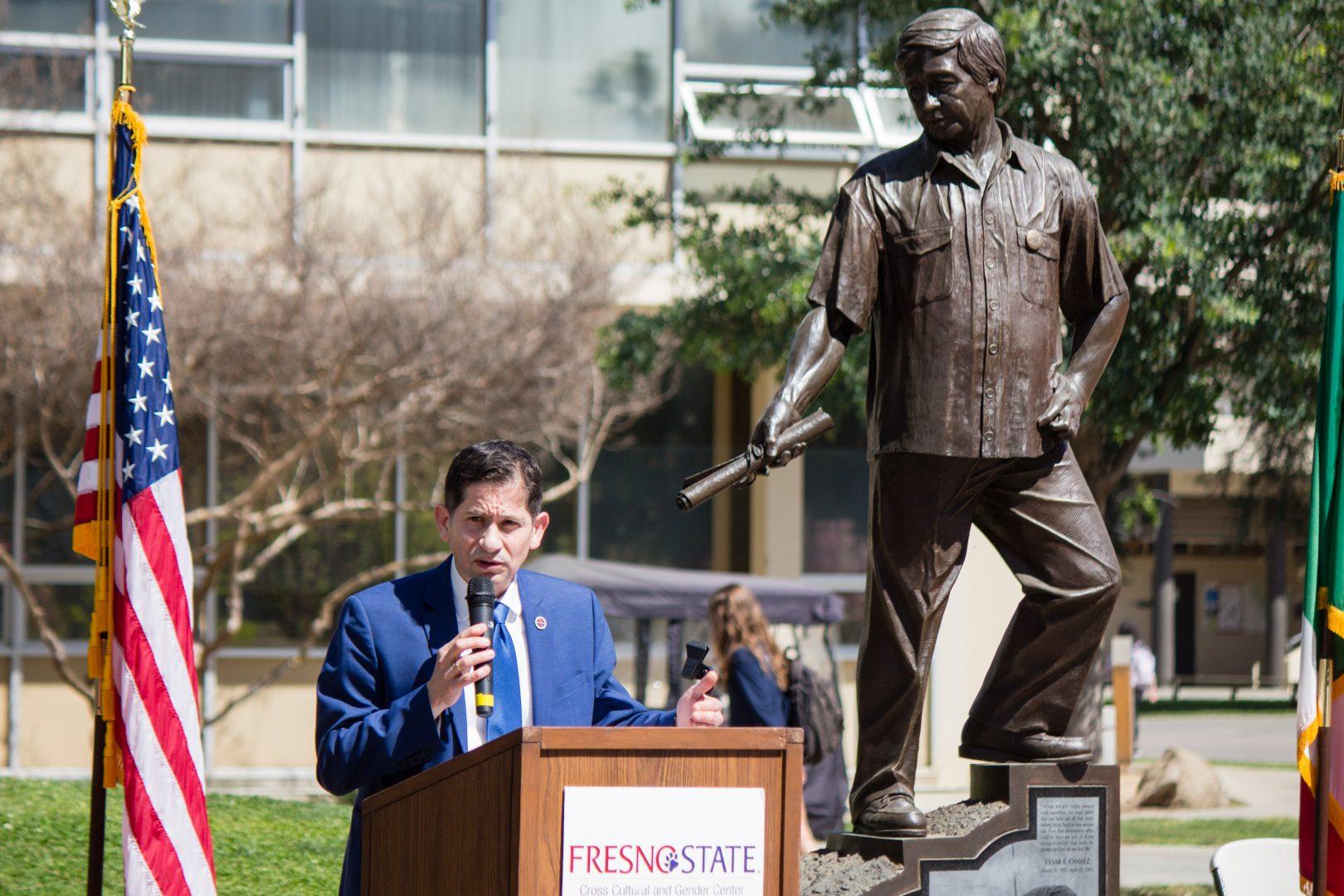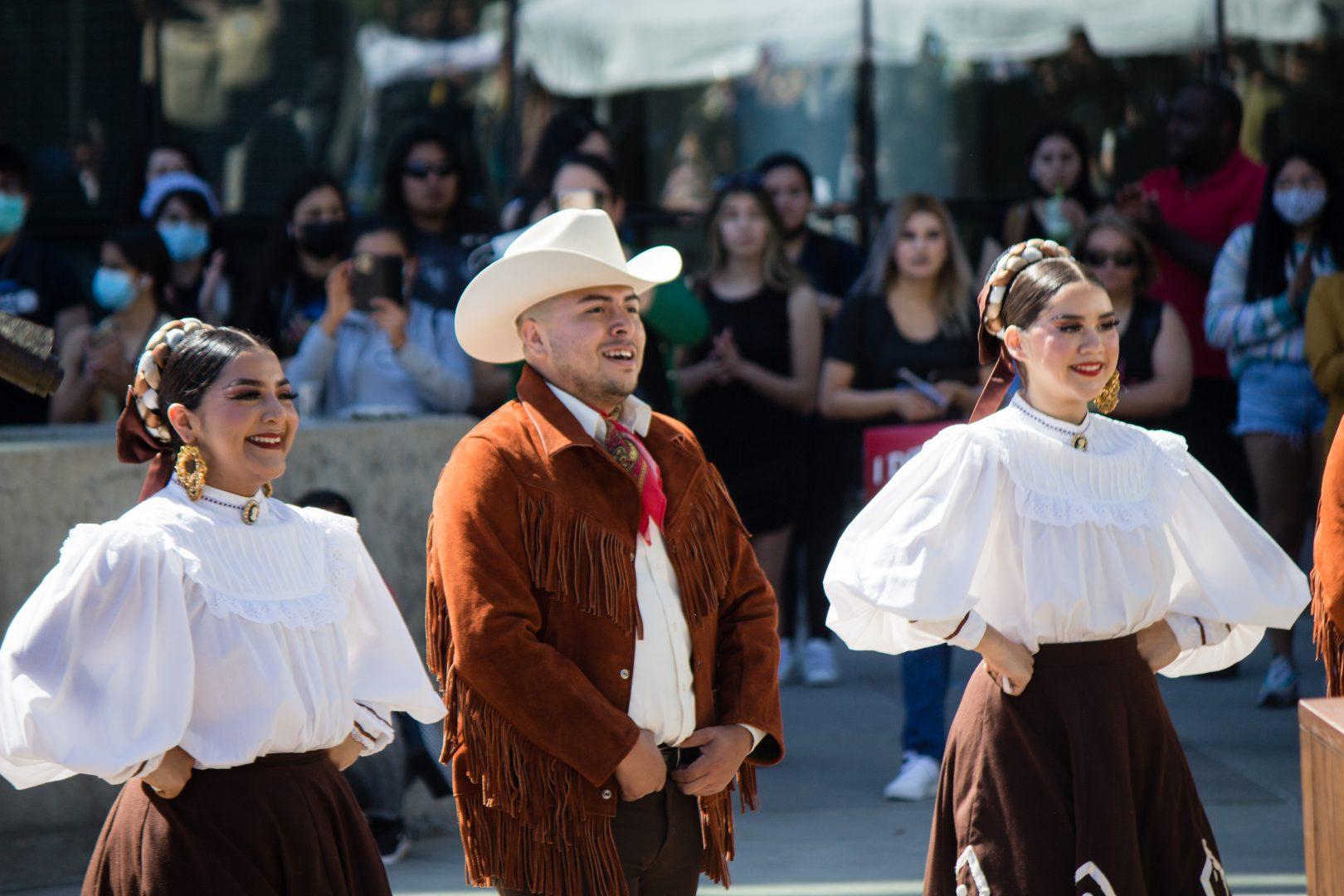Teresa Romero would listen to the TV and radio to learn English, repeating five to seven phrases a day until she mastered them.
“I first came to this country in my 20s, seeking to make a better life for myself, like millions of immigrants before me,” Romero said.
Now, Romero is the first female and immigrant president of the United Farm Workers (UFW) organization, coming from Zapotec descent. She shared her experiences immigrating to the U.S in front of the Cesar Chavez statue at the Fresno State Peace Garden.
Romero was one of many Latinx speakers who shared their stories at the Cesar E. Chavez Commemoration event hosted by the Latino/a Programs and Services, the College Assistance Migrant Program (CAMP) and professor emeritus Sudarshan Kapoor on March 24.
Fresno State students who attended the event on campus were introduced to the Latinx culture through music, food and informational booths hosted by university organizations.
Fresno State student Toni-Rae Cerda hosted a booth for her Latina and multicultural-based sorority, Gamma Alpha Omega. It was her first time hosting a booth and endorsing the sorority. She said she was “praying that it goes well,” but also noted that it felt good representing her culture.
“I am Latina, so it makes me feel like part of the culture… I just think it’s a really great representation of [Chavez],” Cerda said.
“I’m so happy this is happening. It brings a lot of awareness… especially for something Cesar Chavez led with, which was fighting for the rights of farmworkers,” Armando Santos, president of the Beta Gamma Nu fraternity, said.
Each spring, Beta Gamma Nu plans to host a philanthropy event focused on feeding farmworkers by collecting donations and organizing fundraisers. It’s the fraternity’s second year doing this and with the money, it pays taco trucks to go directly to the farmworkers.
Santos, who is completing his first one-year term as president of the fraternity this semester, noted that the Cesar E. Chavez commemoration was a good opportunity to collect donations. People at the booths signed postcards that were given to the farmworkers.
Beta Gamma Nu also collaborated with Latino/a Programs and Services and CAMP, collecting donations of long-sleeved shirts and bandanas for farmworkers to wear.
“Once we made connections with folks that had these experiences working in the fields or had family that worked in the fields, it became really clear that it was important for us to shine a light on those voices,” Deyanire Del Toro, the Latino/a program coordinator, said.
“Of course, this is a celebration of Cesar Chavez, but we want people to knowthe fight is still there, [it] still exists,” she said.
It was Del Toro’s first time coordinating the event in-person, after the past two years were held virtually.
The commemoration began with a folklorico dance performance from Los Danzantes de Aztlán, a Fresno State institution founded in 1970.
“[Los Danzantes de Aztlán] has always been a source of welcoming for Latino students who want to connect with their heritage,” Victor Torres, director of the dance program, said. “They’re also asserting their sense of identity. That I am a Latino or Latina, Latinx, and I am proud of who I am.”
After they performed a dance from Nuevo Leon, Mexico, Fresno State student Mel Lopez spoke about her time working in the fields in the Central Valley. She said she spent her “childhood, teen years, summers and school breaks” working.
After years of working in the fields, Lopez said she started to notice the tough demands of the job, and even for someone who started young like her, it was never enough.
“I thought about my coworkers. What about the older people? What about pregnant women?” Lopez said. “My mother was [one of] the few workers who worked during her pregnancy till she reached the five-to-six-month mark.”
She also noted that farmworkers continue to work with health problems like diabetes and asthma with no health insurance to treat it. Lopez ended her speech talking about “the need for better human and labor rights.”
Fresno State Interim Provost and Vice President for Academic Affairs Xuanning Fu followed with his own words honoring Chavez. After Fu, Romero gave her speech, starting off with Chavez’ history.
Romero said it was “fitting” that the event was held in the Peace Garden, comparing Chavez’ strategies and principles of nonviolence to Mahatma Gandhi, who also has a statue in the garden.
Chavez also fasted like Gandhi in order to protest against poor treatment of farmworkers, Romero noted. She felt honored to be following the steps of former UFW presidents Chavez and Arturo Rodriguez. Romero then talked about current issues the UFW is currently facing.
UFW recently sponsored a bill to ban the use of chlorpyrifos in California due to the damage it caused on kids and babies in the farmworker community. It also marched in Sacramento last year to push the Agricultural Labor Relations Voting Choice Act, which allows farmworkers to vote for their union representative by mail. Romero said currently union members can only vote at their work premises, which can be intimidating for the workers.
The bill was vetoed by Gov. Gavin Newsom in Sept. 2021 but was introduced again by UFW this year.
“It’s angering to hear all the ways that we’re failing our farmworkers,” Del Toro said. “It was very touching to hear people speak on their experiences… but also kind of reminds you of how much left we have to go.”
“This is a population in the labor force that is meaningful to our country, that puts food on our tables, and we need to make sure that we respect them the way they respect us,” Romero said.





